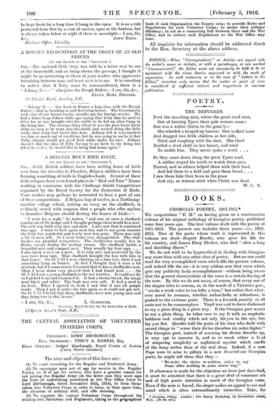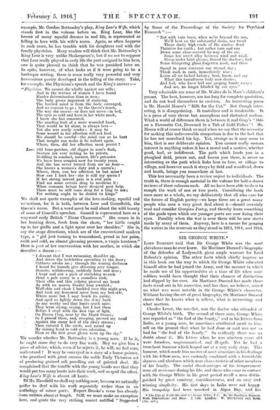B 0 0 K S.
GEORGIAN POETRY, 1913-1915.* WE congratulate " E. M." on having given us a continuation volume of his original anthology of Georgian poetry, published some four years ago. The first volume dealt with the poetry of 1911-1912. The present one includes three years---i.e., 1913- 1915. Two of the poets whose work is represented in this volume are dead—Rupert Brooke, who gave his life for his country, and James Elroy Fkcker, who died " after a long and disabling illness."
We do not wish to be hypercritical in dealing with Georgian any more than with any other class of poetry. But no one could read the very accomplished verse which fills the present volume, and indeed fills the air—it is very seldom now that verse which gets any publicity lacks accomplishment—without being aware that the general characteristic of the verse is a certain forcing of the note. By this we do not mean, of course, that every one of the singers tries to scream, or, in the words of a Victorian pool,, " cracks a weak voice to too lofty a tune," but rather that what- ever mood he assumes, whether melancholic or robustious, is pushed to the extreme point. There is a feverish anxiety at alt costs not to be commonplace. Virgil was said to have disdained to say a plain thing in a plain way. If the Georgian poet wants to say a plain thing, he takes care to say it with an emphatic baldness and crudity which not only bit you in the eye, but lay you flat. Quarles told the poets of his time who dealt with sacred things to " screw their divine theorbos six notes higher." The Georgian poet, instead of screwing his divine theorbo up, is very apt to unscrew it, and so to reach either a hi id of simpering simplicity or sophistical squalor which smells of the lamp rather than of the real slum. Indeed, if a new Pope were to arise to pillory in a new Dunciad our Georgitiu poets, he might tell them that they- " Re-write the thrice re-written, strive to say
Some older nothing in some newer way."
If allowance is made for the objection we have just deserilifid, it must be admitted that there is a great deal of conscious art and of high poetic intention in much of the Georgian verse. Even if the note is forced, the singer makes an appeal to ear and mind which is often extraordinarily attractive. Take, for • Georrian. Peel:v. London : The redly Bookshop, 35 Devonshire testy W.C. 13e. Bd. net.1 example, Mr. Gordon Bottomley's play, King Lear's Wife, which stitndii first in the volume before us. King Lear, like the heroes of many squalid drainas in real life, is represented as falling in love- with his wife's nurse. Again, as often happens in such cases, he has trouble with his daughters and with the family physician. Many readers will think that Mr. Bottomley's King Lear is very unlike Shakespeare's, but if we are to suppose that Lear really played in early life the part assigned to him here, one is quite pleased to think that he was punished later on. In spite,' however, of what looks as if it were going to be a burlesque setting, there is some really very powerful and very harmonious poetry developed in the telling of the story. Take, for example, the Physician's speech and the King's answer :— "Physician. We cannot die wholly against our wills ;
And in the texture of women I have found Harder determination than in men ; The body grows impatient of enduring, The harried mind is from the body estranged, And we consent to go ; by the Queen's touch, The way she moves—or does not move—in bed, The eyes so cold and keen in her white mask,
I know she has consented.
The snarling look of a mute wounded hawk,
That would be let alone, is always hers—
Yet she was sorely tender ; it may be Some wound in her affection will not heal.
We should be careful—the mind can so be hurt
That nought can make it be unhurt again.
Where, then, did her affection most persist ?
Lear. Old bone-pateher, old digger in men's flesh, Doctors are ever itching to be priests, Meddling in conduct, natures, life's privacies. We have been coupled now for twenty years, And she has never turned from me an hour— She knows a woman's duty and a queen's ; Whose, then, can her affection be but mine ? How can I hurt her—she is still my queen ? If her strong inward pain is a real pain Find me some certain drug to medicine it; When common beings have decayed past help, There must be still some drug for a king to use ; For nothing ought to be denied to ling."
We shall not quote ..examples of the love-making, squalid and ro"nistious, for it is both, between Lear and Gormflaith, the Queen's nurse. But a word must be said about the wild beauty of some of Gonerirs speeches. Goneril is represented here as a, -wayward early British " Diane Chasseresse." She comes in in her bunting dress, fresh from the chase, " her kirtle caught up in her girdle and a light spear over her shoulder." She is, say the stage directions, which are of the conventional modern type, a " girl just turning to womanhood, proud in her poise, swift and cold, an almost gleaming presence, a virgin huntress." Here is part of her conversation with her mother, in which she describes a dream :- " I dreamt that I was swimming, shoulder up,
And drave the bedclothes spreading to the floor ; Coldness awoke me; through the waning. darkness I heard far hounds give shivering acry tongue, Remote, withdrawing, suddenly faint and near ; I leapt and saw a pack of stretching weasels • Hunt a pale coney in a soundless rush, Their elfin and thin yelphng pierced my heart As with an unseen beauty long awaited ; Wolf-skin and cloak I buckled over this night-gear, And took my honoured spear from my bed-side, Where none but I may touch its purity,
And sped as lightly down the dewy bank
As any mot•hy owl that hunts quick mice.
They went crying, crying, but I lost them
Before I stept with the first tips of light, On Raven Crag, near by the Druid Stones ;
So I paused there, and, stooping, pres-sed my hand Against the stony bed of the clear -stream ;
. Then entered I the circle, and raised up My shining hand in cold stern adoration, Even as the first great gleam went up the sky."
We wonder whether Mr. Bottouiley- is a young man. If he is, he ought some day to do rely fine work. May we give him a piece of advice, which, even if he rejects it, he will, we feel sure, understand ? It may be conveyedin "a, story of a hoose-painter, who practised with great success the-noble Early Victorian art of producing grained . oak panelling out of painted deal. Ho complained that the trouble With the young hands wag that they would put too manyknots into their work, and so spoil the effect. King Liar's Wife is alniost all lMets... bi- Mr. Masefield we shall say nothing now, lieca,use we naturally prefer to 'deal -With his walk separately rather than in an antholOgy of minor 'poets. Rupert Brooke's verse has already ,been written about at length. Still; we must make an exception here, and quote the very striking sonnet entitled " Suggested
by Some of the Proceedings of the Society for Psychical Research "
Not with vain tears, when we're beyond the sun,
We'll beat on the substantial doors, nor tread Those dusty high-roads of the aimless dead Plaintive for earth ; but rather turn and run Down some close-covered by-way of the air, Some low sweet alley between wind and wind, Stoop under faint gleams, thread the shadows, find Some whispering ghost-forgotten nook, and there Spend in pure converse our eternal day ; Think each in each, immediately wise ; Learn all we lacked before ; hear, know, and say What this tumultuous body now denies ; And feel, who have laid our groping hands away ;
And see, no longer blinded by our eyes."
Very admirable are some of Mr. Walter do la Mare's children's poems. The best, however, are too long for complete quotation. and do not lend themselves to excision. An interesting poem is Mr. Harold Moines " Milk for the Cat." But though inter- esting, it is disappointing. It tantalizes and is intolerable. It is a piece of very clever but amorphous and rhetorical realism. What a world of difference there is between it and Gray's " Ode on a Favourite Cat, Drowned in a Tub of Gold Fishes" ! Mr. Morro will of course think us mad when we say that the necessity for making this unfavourable comparison is duo to the fact that he has not moralized his lay. Yet, strange as it may seem to him, that is our deliberate opinion. You cannot really sustain interest in anything unless it has a moral and a motive, whether good, bad, or indifferent. The path which lands you in a ploughed field, peters out, and leaves you there, is never so interesting as the path which links lane to lane, or village to village, and however much it strays by field and woodland, down and heath, brings you somewhere at last.
This has necessarily been a review unjust to individuals. The truth is, there is enough material-in the volume for half-a-dozen reviews of three columns each. All we have been able to do is to sample the work of one or two poets. Considering the book
once more as a whole, we say deliberately that all who cam for
the future of English poetry—we hope there are a great many people who care a very great deal about it—should certainly read and consider Georgian Poetry, and thereby learn something of the goals upon which our younger poets are now fixing their
eyes. Possibly when the war is over there will be new starts made by many of them. Anyway, here is a means for gauging the waters in the reservoir as they stood in 1913, 1914, and 1915.



































 Previous page
Previous page